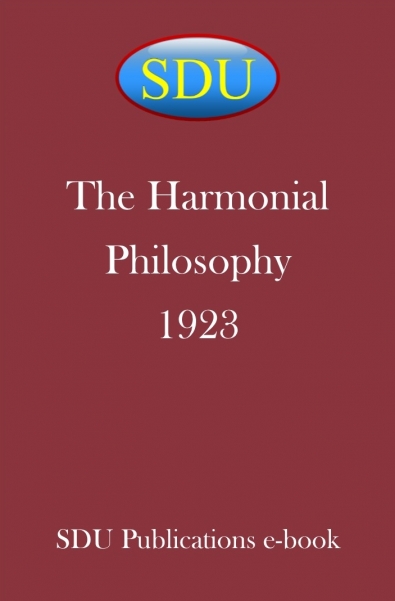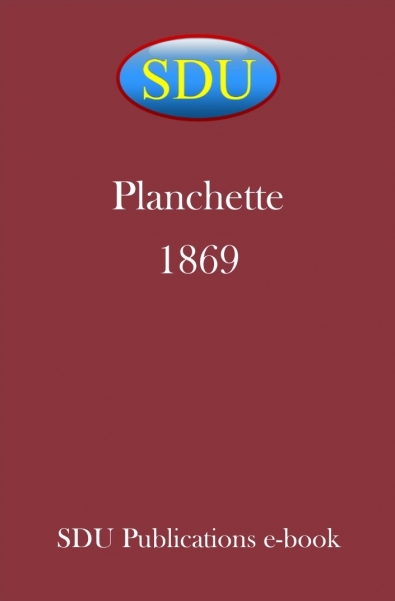DESCRIPTION
Published in 1923 | 466 pages | PDF reader required
The seership of Andrew Jackson Davis was attracting wide attention in America, and in a more restricted sense was known also in England, some few years before the Rochester Knockings inaugurated the epoch of modern Spiritualism. By the hypothesis, it gave forth—like the latter—a revelation from the world beyond, and was to all intents and purposes an early example of trance mediumship, though Davis never claimed to speak under the influence of specific personal controls, like the long line of psychic orators who came after him and were, for the better part, his contemporaries. As he was, on the one hand, so much the most important of all that there is no person who could be placed in the second rank beneath him, so he has been of all the most popular. The Principles of Nature, his first book of revelations, and the only one which claims to have been dictated by him in the "magnetic" state, has passed through at the least forty-four American editions, and as there is no question that it is still in demand, it is likely to be reprinted again—perhaps many times over. It is the most comprehensive of all his writings. He wrote and published continuously during a long period of years, and his readers seem to have been no less eager than he was himself untiring, the demand for his successive volumes being always large. His collected works have been issued on several occasions, available sometimes in single volumes separately, sometimes in complete sets only.
The reason of this popularity is not far to seek. In The Principles of Nature a philosophy of modern Spiritualism preceded Spiritualism itself, and so also a doctrine concerning the world beyond in that sphere which was held to be in immediate contiguity with the life of earth was put forward as the result of personal knowledge in seership, while later on a thousand voices coming from that sphere and, according to the claim of Spiritualism, speaking through a thousand mediums, testified to its general truth. There is no seer of the past—and there is no prophet—who had such a cloud of witnesses. The effect was greater and stronger because they did not set out to testify in favour of Davis; he was not for them the precursor of all those voices, but that which he affirmed was by them verified without reference to him. The doctrine, in a word, was that the world beyond is as natural as this world of ours; that it is neither the heaven nor hell of official Christianity; that it is simply this world spiritualised, and that men and women in their psychic bodies are as men and women here in the bodies of flesh, but with better opportunities of progress and a far better environment. They are encompassed by helpers innumerable, so that those even who pass from the life of earth in a state of hardened criminality have every encouragement to amend and ultimately never fail to do so. In a word, the gospel of Davis, in common with that of Spiritualism, cast out all fear concerning the life to come. The prototype of Davis is a still greater seer in the person of Emanuel Swedenborg; but whatever its claims and merits—about which much yet remains to be said after a new manner—the doctrine of the New Jerusalem, according to the Swedish prophet, will bear no comparison on the ground of popular appeal with the "Divine Revelations" of him who was the Poughkeepsie seer and the exponent of Harmonial Philosophy. It is obvious that this is put forward in the only reasonable and therefore possible sense, not as a test of truth or even a title of excellence, but as a purely explanatory statement concerning a great vogue.
Whatever their deserts or defects otherwise, the postulated principles of Nature are embodied in a work which marks an epoch, and it gave a status to Spiritualism when that movement and all its host of phenomena were still in the womb of time. Later on it is evident abundantly that this movement and the revelations involved therein reacted on Davis, quite naturally and quite of necessity too. They led of course to no change of ground, for essentially they belonged to one another, but he was stimulated under their influence, and they gave him, moreover, a field, an audience, an opportunity which he could scarcely have had in their
absence.
This was the position at the beginning of the new movement, and speaking as one who is acquainted with all the activities and nearly the whole literature of modern psychological and occult schools, it remains to be said that—so far as English-speaking countries are concerned—the seer and prophet of Spiritualism in its first days is even now par excellence—but I speak of excellence as judged within the limits- of the schools—the prophet and philosopher, if not also the seer, of the present moment. Time has changed otherwise the actual modus videndi in many important respects. No one speaks of a rainbow-belt among the star-clouds of the Milky Way as the world of disembodied souls. No one expresses or owns to any special view or concern about humanities of other planets and whether they proceed at death to that Second Sphere which receives souls from earth. No one accepts or denies the Davis classification of six spheres of intelligent being, with a seventh which is a Central Sun and the more particular abode of the Godhead. But of the general philosophy of Spiritualism, and of all that is weak as of all that is strong therein, Davis is the general exponent, if only there is—practically speaking—no other who has arisen. It is difficult even now to take up a current number of any periodical devoted to the concerns of the subject and not find that he is quoted. His classification of mediumship was in all probability a matter of suspicion from the beginning, and it might be derided now, while there are many other views of his which have passed into utter desuetude; but he himself remains the spokesman at large of the subject, so far as man's place in the universe, the contiguity and interpenetration of the two worlds are concerned. On the other hand, in so far as he came forward in the guise of a scientific teacher—under "control" or psychic influence—he probably convinced few or none, even at the beginning, and he reflects now the most primitive side of the most exploded authorities. His titles to consideration are those of a seer; his visions of the world beyond are the appealing side of his seership; and for persons who accept the possibility of such experiences, there is nothing in all the annals of psychism to compare with his Summer Land. The ten thousand controls of later mediumship—except in so far as they reflect his revelations—tell us little or nothing concerning the phenomena of physically disembodied life. He has set out all its phases, all its topography, all concerns therein, and we shall doubtless have to await the advent of another prophet before anything substantial is added thereto or altered substantially therein. Meanwhile the important investigations of psychical research, apart from professed Spiritualism, remove us by the nature of things from the philosophy of the subject, being concerned with the facts of manifestations and with tolerable deductions from these, not with the nature and pursuits of the spiritual spheres of being.
Now, the collected writings of Andrew Jackson Davis fill twenty-seven volumes, full of repetitions, verbosities and extraneous material. On account of the position which he has occupied for a period of seventy years in a movement which numbers at this day many thousands of adherents in Great Britain and the Colonies alone, it has seemed to the present editor that it would be serviceable to them and others to present—in the form of a digest—the essential parts of his doctrine, philosophy and testimony to the world of spirits and the natural law therein. The result of that undertaking is offered in this volume. As regards all that is incorporated and all that is excluded, it represents of course the personal views of the editor in respect of presumptive values, and he makes no claim to the possession of a final criterion. The work has been done with sincerity; nothing has been inserted because it appeals to him personally, apart from other considerations; nothing has been omitted because it opposes his views. Except upon points of fact those views are obtruded nowhere, and as far as possible they enter into expression nowhere. The object has been to present the essence of Davis, and though the task as a whole has been anxious rather than easy, there has been throughout a singular satisfaction in observing how that essence has been extracted in the process of condensation without diminution of any kind, though many original pages may be represented occasionally by a single paragraph. There is no need to say that the process has involved re-expression—as it is believed, to the advantage of Davis and never to the sacrifice of the meaning which he designed to convey (It has not of course been possible to rectify reasoning, where this must be regarded as defective). A few among those who know him may think that his anti-theological views should have been represented more fully; but enough has been given to show how he stood as to this subject. The particular circumstances under which he was born and lived denied him qualifications for judgment thereupon; even at his own period he did not represent the real difficulties of doctrine, and at the present day we are dealing with different and perhaps greater difficulties. In any case the ground has changed, and the animadversions of Davis, both in and out of season, but too often sacrificing the logical sequence of his text, were of less moment at their period than the discourses of Bradlaugh or Ingersoll and are of no consequence now. There are a few others who may feel that an undue space has been given to descriptions of the Summer Land, as Davis claims to have seen it in his "superior condition"; but without attempting to pronounce on their value, it is believed that they have been always the chief attraction of his "revelations," and that his "harmonial philosophy," apart from these as a title or warrant in seership, would scarcely demand presentation in a new form, its great occasional insight and suggestion notwithstanding. It is in connection with these more especially that this work has been undertaken, and to mark the philosophical aspects of the claim respecting intervention between the physical and spiritual worlds.
To sum up, the message of Davis, as here presented, stands in the editor's opinion for the spirit or essence of the whole, liberated only from unwieldy accretions into which the essence does not enter, and of course separated from other extraneous matter—as, e.g. things which belong to the domain of medical formulae. It is very curious, in conclusion, to note the various points at which the Harmonial Philosophy of Davis is in quite unconscious harmony with the Hermetic Science, of which the editor claims to be a student, as also with the later theory of evolution. A few instances belonging to the first case have been cited in the notes, the most striking of all being his theory of a universal fluid, which corresponds to the Astral Light of the Martinists and to the Kabalistic so-called "light of glory." These analogies could have been traced further, but it exceeded the present undertaking, which appeals to a class of minds whose acquaintance with occult lore cannot be presupposed.


